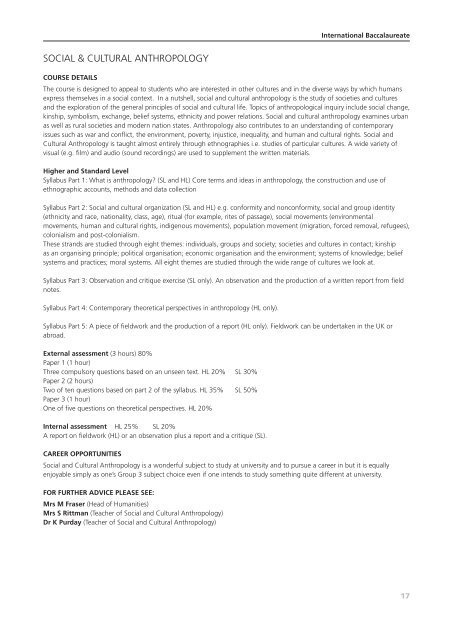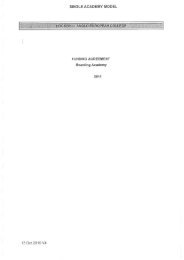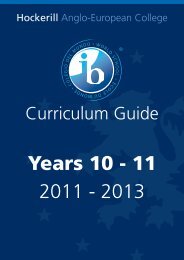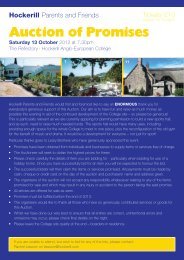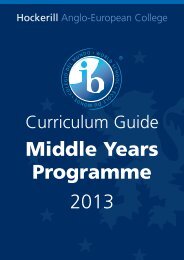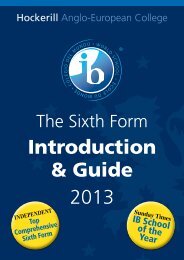Sunday Times Parent Power - Hockerill Anglo-European College
Sunday Times Parent Power - Hockerill Anglo-European College
Sunday Times Parent Power - Hockerill Anglo-European College
Create successful ePaper yourself
Turn your PDF publications into a flip-book with our unique Google optimized e-Paper software.
SOCIAL & CULTURAL ANTHROPOLOGY<br />
International Baccalaureate<br />
COURSE DETAILS<br />
The course is designed to appeal to students who are interested in other cultures and in the diverse ways by which humans<br />
express themselves in a social context. In a nutshell, social and cultural anthropology is the study of societies and cultures<br />
and the exploration of the general principles of social and cultural life. Topics of anthropological inquiry include social change,<br />
kinship, symbolism, exchange, belief systems, ethnicity and power relations. Social and cultural anthropology examines urban<br />
as well as rural societies and modern nation states. Anthropology also contributes to an understanding of contemporary<br />
issues such as war and conflict, the environment, poverty, injustice, inequality, and human and cultural rights. Social and<br />
Cultural Anthropology is taught almost entirely through ethnographies i.e. studies of particular cultures. A wide variety of<br />
visual (e.g. film) and audio (sound recordings) are used to supplement the written materials.<br />
Higher and Standard Level<br />
Syllabus Part 1: What is anthropology? (SL and HL) Core terms and ideas in anthropology, the construction and use of<br />
ethnographic accounts, methods and data collection<br />
Syllabus Part 2: Social and cultural organization (SL and HL) e.g. conformity and nonconformity, social and group identity<br />
(ethnicity and race, nationality, class, age), ritual (for example, rites of passage), social movements (environmental<br />
movements, human and cultural rights, indigenous movements), population movement (migration, forced removal, refugees),<br />
colonialism and post-colonialism.<br />
These strands are studied through eight themes: individuals, groups and society; societies and cultures in contact; kinship<br />
as an organising principle; political organisation; economic organisation and the environment; systems of knowledge; belief<br />
systems and practices; moral systems. All eight themes are studied through the wide range of cultures we look at.<br />
Syllabus Part 3: Observation and critique exercise (SL only). An observation and the production of a written report from field<br />
notes.<br />
Syllabus Part 4: Contemporary theoretical perspectives in anthropology (HL only).<br />
Syllabus Part 5: A piece of fieldwork and the production of a report (HL only). Fieldwork can be undertaken in the UK or<br />
abroad.<br />
External assessment (3 hours) 80%<br />
Paper 1 (1 hour)<br />
Three compulsory questions based on an unseen text. HL 20% SL 30%<br />
Paper 2 (2 hours)<br />
Two of ten questions based on part 2 of the syllabus. HL 35% SL 50%<br />
Paper 3 (1 hour)<br />
One of five questions on theoretical perspectives. HL 20%<br />
Internal assessment HL 25% SL 20%<br />
A report on fieldwork (HL) or an observation plus a report and a critique (SL).<br />
CAREER OPPORTUNITIES<br />
Social and Cultural Anthropology is a wonderful subject to study at university and to pursue a career in but it is equally<br />
enjoyable simply as one’s Group 3 subject choice even if one intends to study something quite different at university.<br />
FOR FURTHER ADVICE PLEASE SEE:<br />
Mrs M Fraser (Head of Humanities)<br />
Mrs S Rittman (Teacher of Social and Cultural Anthropology)<br />
Dr K Purday (Teacher of Social and Cultural Anthropology)<br />
17


